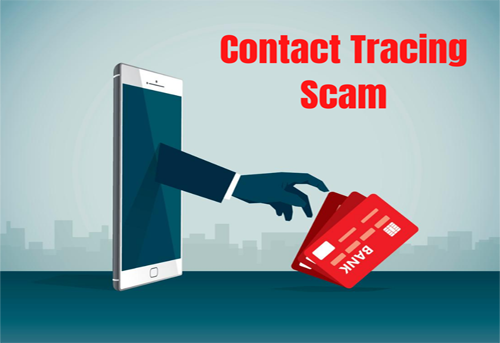Contact tracing scams
July 28, 2020
When an employee working at Mille Lacs Health System has come into contact with Coronavirus at the facility, MLHS Infection Preventionist Vicki Engmark goes into contact tracing mode. Her job is to find exposure and risk, and notify anyone in the MLHS workplace who could potentially become infected, all the while maintaining confidentiality so that patient information laws are not violated. She also calls patients who test positive (other team members call with negative results) or to tell a patient if they had exposure to the virus while at the facility.
When a patient tests positive for COVID-19, that information is given to the state health department. Then, a similar type of contact tracing is done, using the same principles of investigating exposure and risk in that patient’s orbit.
According to the CDC, a successful notification of exposure allows for an exchange of information with the person (contact) exposed to COVID-19 and offers an opportunity to answer questions and provide referrals for testing, medical evaluation and other necessary support services. The goals of this interaction are to inform the person that they may have been exposed to COVID-19, assess their medical condition and other risk factors, and gather information for continued monitoring and support.
However, as Minnesota Commerce Commissioner Steve Kelley noted on the Minnesota Commerce Department website, “As testing expands and more people are diagnosed with COVID-19, contact tracing efforts are providing an opportunity for scammers to try and defraud Minnesotans.”
The “contact tracing” scam has hit at least two patients reporting it to MLHS. It involves a caller telling you that you have been reported as being exposed to someone who tested positive for COVID-19. No names are given; however, you are told you must be tested and quarantined, and then you are asked for a credit card number, so that a “testing kit” can be sent to you.
It’s important to know some information about what a legitimate contact tracing call involves.
Mille Lacs Health System asked the Minnesota Department of Health to elaborate on this. According to the MDH, there are a number of people/organizations that are doing case investigation and contact tracing. These include MDH, local public health, tribal public health, University of Minnesota students, external contractors and BCBS and Medica.
Notes to remember:
- MDH case investigators/contact tracers have 612 phone lines with caller ID “Minnesota Department of Health.” If they leave a message, they leave a 651 number for the person to call back.
- Case investigators/contact tracers are instructed to say they are calling on behalf of the Minnesota Department of Health (unless they identify they are with a local public health or tribal health agency).
- Also, no one from MDH, local public health or affiliated groups doing contact tracing will ever ask for a credit card or money. If someone does ask for that, it is a scam — do not respond.
- If you are concerned that a text message is legitimate or a scam, please know that a public health worker will reach out to you initially by phone call. Scammers are impersonating public health workers by sending a text that includes a link to download software. These texts are scams, do not click! If you click on them, you could download unwanted software or allow the link to access data from your phone.
“Contact tracing is a very important tool for us as we work to slow the spread of this pandemic, and it’s important that people have confidence to respond when contacted,” MDH Commissioner Jan Malcolm stated. “We would text someone only after contacting them by phone, so anyone who receives a text message without having already heard from public health officials by phone should ignore and delete the text.”
